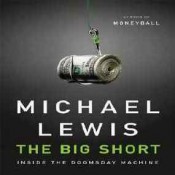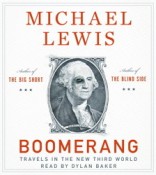Q&A: MICHAEL LEWIS – author – Moneyball / The Blind Side / The Big Short
Written on December 19th, 2014 |
Seeing and Speaking in Narrative
Written on November 12th, 2011The train is rolling by. I’m in my room at the Holiday Inn Capitol in DC and the tracks run right outside my window. The hum communicates enormous weight and power in rhythm punctuated by occasional quick squeals and now and then a whistle moan. Early this morning it half woke me several times. Tonight it sounds beautiful.

I taught a workshop on story and narrative today. One of my top three criteria for a good story is “at least one flesh and blood character”. I emphasize the importance of a protagonist and recommend giving people a human being to identify with, follow, root for, etc. — rather than an organization or an idea
That’s all true and good advice, but it is equally valuable to be able to see and communicate in narratives when the protagonist is not an individual. When it is a team or an organization; an idea, a cause or even a piece of legislation. I contend that looking for narratives and our roles in them is simply a wise way to approach life. We see and feel things and make connections we might otherwise miss.
On top of that, the ability to communicate in narratives pays off in all sorts of ways. People understand narratives and identify with them. Narratives engage. And when you speak in narratives, you’ve got a chance to frame the conversation.
Ira Glass defines the recurring sequence in all This American Life stories: “Then this happens, then this happens, then this happens, and this is what it means. Then this happens, then this happens, then this happens, and this is what it means.”
There’s a narrative to who your organization is. There’s a narrative to how you’ve evolved your mission. There’s a narrative to your biggest achievements. There’s a narrative to what you’re fighting for and what you’re fighting against. There’s a narrative to why your organization is valuable and how it plays an important role in bigger narratives. There’s a narrative to where you want to go in the next year or the next five. In every case it’s basically “Then this happens, then this happens, then this happens, and this is what it means” – or “and this is what we learned.”
Tapping into the unique power of story and narrative calls for both. You want to learn to tell stories of individual human beings with the plot and character arcs that can make such stories sing. And you also want to learn to see and speak in narratives about everything else.
Q&A: MICHAEL LEWIS, MONEYBALL
Written on December 19th, 2010 |
Aired 10/16/11
Both Ira Glass and Malcolm Gladwell say today’s guest is their favorite storyteller. In his books and magazine articles, Lewis writes about sports, business, Wall Street, Silicon Valley, political campaigns, fatherhood. Stuff that matters to a lot of people. He’s smart and he has a sense of humor.
Lewis was a trader at Salomon Brothers before he wrote his first best-seller, LIAR’S POKER about the excesses of Wall Street during the 1980s. He continues to write about that world with his last two books, a column for Bloomberg, and articles in Vanity Fair.
His newest book BOOMERANG: Travels in the New Third World is made up of articles originally published in Vanity Fair and picks up where 2010’s THE BIG SHORT left off. What happens after the meltdown of 07-08? Governments are the focus of this book. Mostly because they have taken on the bad debts of the too big to fail banks, so now they are themselves at risk. Now politics and culture become much more important as to how they will deal with that risk. Then there’s the story of California which as a state ran up unsustainable debts during a series of bubbles and can’t raise the taxes to pay for them.
We’ll also talk about the twisted path taken to get MONEYBALL into theatres. The film based on his 2003 book is now a popular and critical success.
MICHAEL LEWIS received a BA in art history from Princeton University and a Masters in economics from the London School of Economics. He contributes to bloomberg.com and Vanity Fair. His other books include The Blind Side, Panic, The New New Thing, and Home Game.
